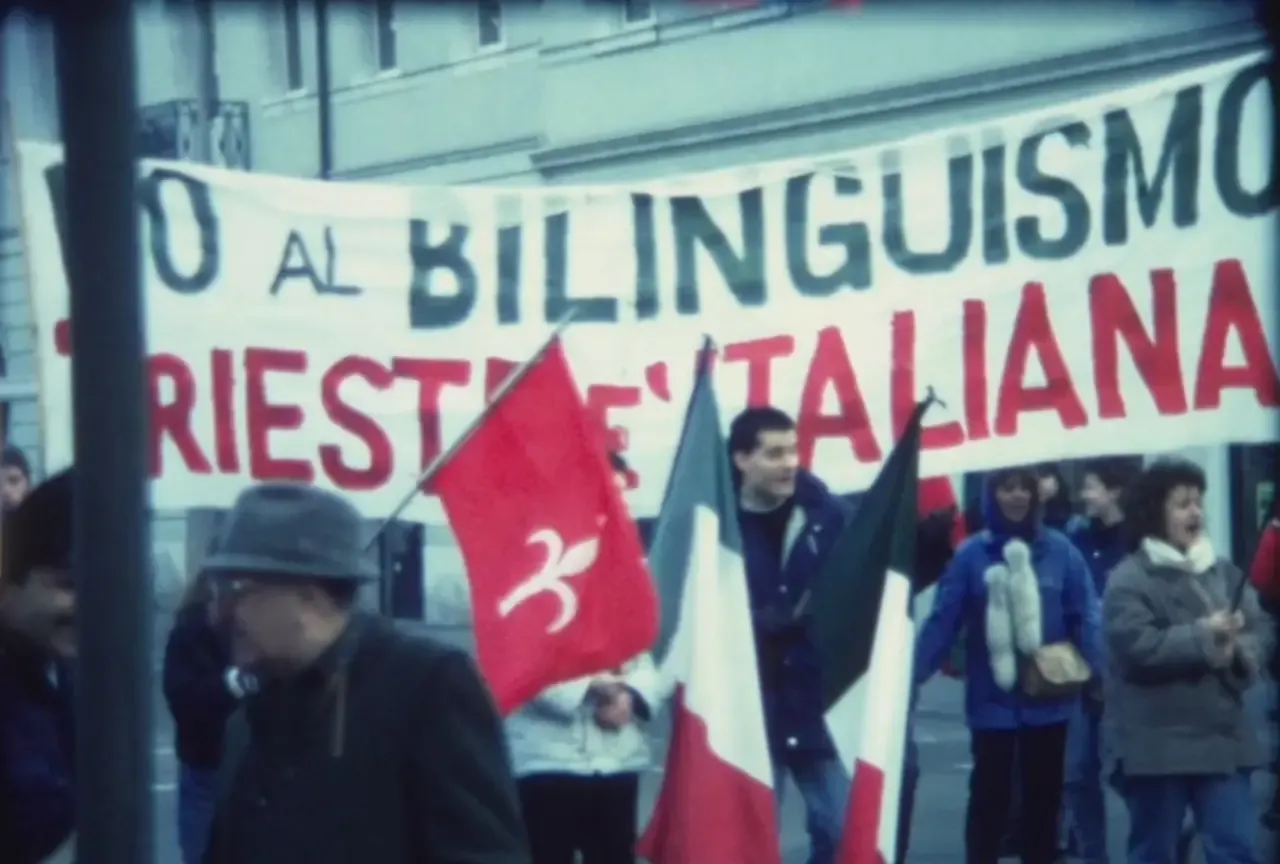Aljoša Žerjal: "No al bilinguismo"

Aljoša Žerjal, a Slovenian, born in Škedenj in Trieste in 1928, has been dutifully immortalizing the outside world through a lens since he was young. The amateur filmmaker, who in the past mostly shot on eight-millimeter tape, achieved great success with his recordings and received many awards for them, and above all, he documented the affinity of everyday life in a sensitive way. In doing so, he often brought the exoticism from his travels around the world into the consciousness of the local audience.
In 2003, as part of the Tribute to a Vision festival, he received the Darko Bratina award, whereby his diverse oeuvre was additionally presented to a wider audience in the cross-border area. In 2018, Kinoatelje in Gorica proudly accepted the entire life work from Aljoša Žerjal as a gift and for permanent preservation. This includes unedited material, completed productions, filmstrip (Super8, 8 mm, 16 mm) and DVD.
A box with Žerjal's handwritten note "No al bilingiusmo" appeared right among the unedited material. A slogan that leads many people to think about the ever-present frictions in the Trieste region and the wider border area, where bilingualism is still often a burning issue and action. In addition to the important footage of the far-right protests in Trieste, this "box" reveals much more. Tributes to the fallen, a very meaningful rally in Rižarna, a wide documentation of socio-political folklore, which are rounded off together through still-life depictions of the beauty of the border landscape, its people, architecture (Karst, Veneto...).
In the process of digitizing the eight-millimeter tape, 104 minutes of important documentary material was created under the watchful guidance of young experts at Camera Ottica in Gorizia, which revalues Žerjal's work and offers the viewer an insight into the tradition and motivation of the frontier moment.
Announcements/
Filmska umetnost kot orodje preseganja meja
09. 04. 2025Nekatere meje so vidne, druge nevidne. Nekatere ločujejo, druge združujejo. Obmejna regija med Slovenijo in Italijo je bila stoletja prizorišče prepletanja kultur, zgodovinskih preobratov in človeških usod. Lahko zgodovino pogledamo skozi film in jo razumemo skozi umetnost? Retrospektiva Oriente Vzhod / Occidente Zahod – Meja skozi film in zgodovino, ki jo Kinoateje organizira v sodelovanju s številnimi partnerji in je del uradnega programa Evropske prestolnice kulture GO! 2025 ponuja prav to – potovanje skozi filmske podobe, ki raziskujejo življenje na robu in središču Evrope hkrati.
Popotnica retrospektivi: Stojan Pelko in Vlado Škafar
09. 04. 2025Zdaj, ko je prestolnično leto že v polnem teku, je mogoče nekoliko lažje primerjati posamezne discipline oziroma sklope programov. Upam si reči, da je Filmsko mesto, kakor smo poimenovali cel sklop filmsko-kinematografsko-avdio-vizualno-animiranih projektov eden tistih, ki dobesedno hkrati producira rezultate doma in na tujem – pri čemer doma pomeni ne le v goriškem somestju in po Sloveniji, ampak po celi Evropi.
Transcending Borders Through Film – Andrej Šprah
09. 04. 2025Film clubs play a crucial role in shaping film practices, cultures, and policies, as they serve as spaces for intense discussions where new ideas emerge. These clubs often evolve into institutions, although institutionalization is not always necessary.

